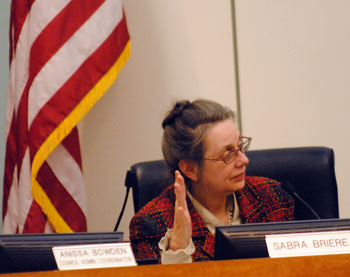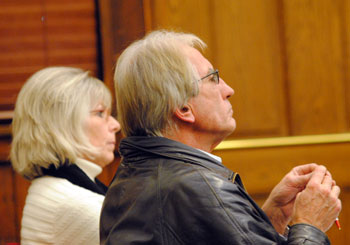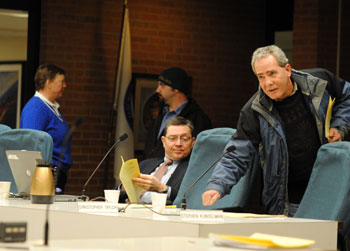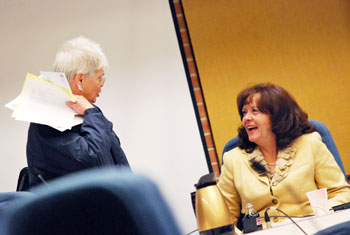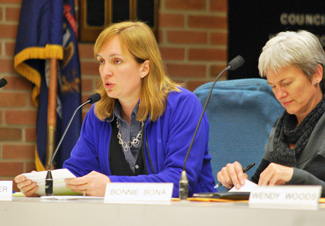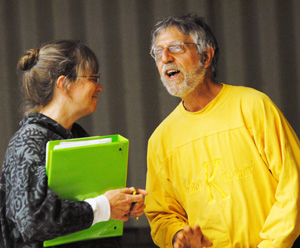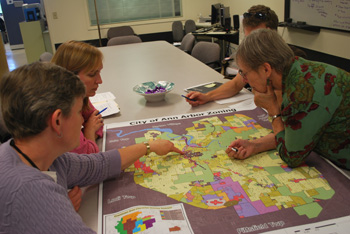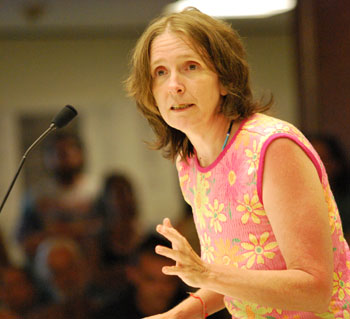Ann Arbor City Council meeting (Nov. 15, 2010): On Monday, the council postponed action on some major policy questions, but approved six water-related items.
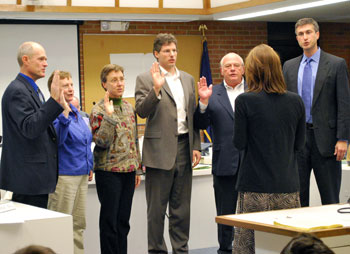
Ann Arbor city councilmembers are ceremonially sworn in to start their two-year terms. From left to right: Mayor John Hieftje, Sandi Smith (Ward 1), Margie Teall, Carsten Hohnke (Ward 5), Tony Derezinski (Ward 2) and Christopher Taylor (Ward 3). Administering the oath, with her back to the camera, is city clerk Jackie Beaudry. (Photos by the writer.)
The council approved a $1,168,170 bypass around the Argo dam that will take the place of the current headrace, which is separated from the Huron River by an earthen embankment. The bypass will eliminate the portage currently required by canoeists. It would also allow the city to comply with the consent order it has with the state of Michigan that requires the city to address the repair of toe drains in the embankment.
Another item – on the funding of dam maintenance – was in its original form related more closely to the Argo bypass than in its amended version. The council approved a resolution that directed the city administrator to end the payment for repairs, maintenance and insurance of Argo and Geddes dams from the city’s drinking water fund. The shift in dam activity funding will be effective with the start of fiscal year 2012, which is July 1, 2011. An amendment to the original resolution, however, had the impact of leaving intact a previously budgeted $300,000 from the drinking water fund for possible construction of the Argo bypass.
The third water-themed agenda item approved by the council was $553,320 for fabrication of a piece of exterior art – a fountain-like sculpture – that had been commissioned from German artist Herbert Dreiseitl for the new municipal center. Dissenting votes were cast by Sabra Briere (Ward 1), Stephen Kunselman (Ward 3) and Marcia Higgins (Ward 4).
The council also approved the receipt of a $216,723 Federal Emergency Management Agency (FEMA) grant for the purchase and demolition the structures at 215 and 219 W. Kingsley Street, which are located in the Allen Creek floodway. The area is subject to flooding during heavy rainstorms. The site will be modified in a way to create a small stormwater retention area, with $72,241 in city funds for the project to be drawn from the stormwater capital budget.
The council approved a drainage easement related to the new underground parking structure being constructed on Fifth Avenue. A final item related to water – in its frozen form – was an authorization to treat the Big Chill hockey game on Dec. 11 the same way that football Saturdays are treated, with respect to vending and parking near Michigan Stadium.
Among the postponed items was a modification to the zoning code to regulate medical marijuana facilities. In conjunction with that postponement, the council also extended a moratorium on the use of facilities for dispensing or cultivating marijuana for 60 days – until Jan. 31, 2011. At the council’s Dec. 6 meeting, it will give initial consideration to a licensing requirement for medical marijuana facilities. Then at its Dec. 20 meeting, it will give final consideration to both the zoning regulations and the licensing proposal.
Also among the postponed items was the conversion of the city’s composting facility to a merchant operation, which would offer a contract to WeCare Organics, a New York-based firm. The proposal on the compost operation will come back to the council at its Dec. 6 meeting. The council also postponed for a third time revisions to the city’s area, height and placement zoning regulations. For another zoning-related item, the council extended a deadline from Dec. 6, 2010 to Feb. 22, 2011 for the design guidelines task force to complete its work.
In other action, the 15th District Court judges will now have a place to sit in the new municipal court facility. A previously twice-postponed item to authorize a budget revision of up to $160,000 to purchase furniture for the court was approved. The dollar amount was reduced to about half that figure, after the court was asked to produce an itemized list of the furniture it intended to buy.
The council also entertained a customary range of public commentary and communications from its own ranks. [Full Story]




